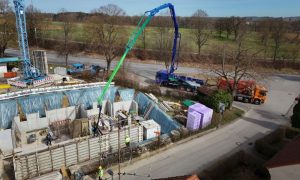Women in Construction: EDGE’s Merehan Kika
“At EDGE, there’s no limit to how far a female can progress – we are given the same opportunities as men”

“In the construction industry, there is a widespread notion that women will have a hard time dealing with the rough conditions on-site, and this is just not the case. The sooner companies give women the opportunity to prove themselves in the industry, the sooner this sort of thinking will disappear.”
As part of the Women in Construction series, Jason Saundalkar talks to EDGE’s Merehan Kika about her influences, career and gender diversity in the construction industry…
What drove you to get into construction and your very first role in the industry? What were some of the influences that set you on your path?
I’ve always been driven to pursue a career that allows me to directly impact people’s lives in a positive way, and architecture gives me the platform to achieve my goals. In my spare time I am also a passionate painter and have always enjoyed creating pieces that aim to capture the imagination of the viewer. I feel that being an architect allows me to translate and apply my artistic creativity to designing buildings, with the aim of capturing the imagination of the city’s inhabitants and visitors.
I wish to capture the same emotion in my architecture, when my pencil touches sketch roll, as when my paint brush touches a canvas.
What interests me the most is knowing how a building functions and what is required to create the most pleasant experience for the people who will engage in the spaces. Every building is different and presents different challenges, therefore this industry is never repetitive and pushes me to constantly learn and adapt.
Tell us about your career, mentioning key milestones.
I received my bachelor’s degree from the American University of Sharjah, which offered a combination of design training and technical knowledge about the functionality of a building. I then joined EDGE and have been working here for three years. I’ve had the opportunity to work on many projects, most of which are high-rise towers, including the 1/JBR luxury residential tower. With the latter, I worked on the project from the concept stage to tender stage, and it’s great to see the project now taking shape.
What would you say is your proudest moment in the industry?
My proudest moment was working on the 1/JBR tower. I was able to successfully coordinate between teams of engineering consultants and male-dominated client teams. During the process, I was able to show everyone that women are equally capable and that we can all work together to overcome the challenges we face every day in the industry.
How do you see the GCC construction markets changing in the coming years? Share your thoughts and views of the market.
The construction industry is still male-dominated in the region. Working with engineers and workers on-site, young women are constantly challenged and must work harder to prove themselves in order to gain the same amount of trust and respect a young man would normally be granted right away.
With time and persistent hard work, I’ve found that people are willing to alter their perceptions. I’m proud to say that I’ve now had the pleasure of working with many talented engineers and clients who were very supportive and were a delight to work with.
Everyone has a part to play in diversity and equal pay. What would you like to see government authorities and construction firms do to increase diversity and make pay a level playing field?
Governments should look at implementing laws regarding the minimum number of women employed by construction companies. Laws like this will drive firms to give women a chance to gain experience in the field and prove themselves.
When looking for a site architect, many firms automatically search for an older male, which results in the loss of potential talented female architects that could add great value to the team. I’m not saying women have more to offer; however they definitely do not have less, and should be given equal opportunity and access to such roles.
Besides authorities and construction firms, who else can play a part in increasing diversity and balancing pay scales?
Universities can play a role in training women and introducing on-site training and experience as part of their curriculum, in order to arm women with the experience and tools needed to get into the construction field in the future. It is my opinion that architectural universities in the GCC are more design-based and need to focus more on the technical side of architecture, since this is what’s required by the construction industry.
As a woman in the industry, what has your experience been working in the GCC construction sector? If you have worked in markets outside the GCC, how does your experience here compare with what you’ve experienced and observed in other markets?
I am fortunate to have very supportive bosses who believe in me and have constantly pushed me to grow from day one. They are constantly challenging me and placing me in situations where I have the opportunity to prove myself, and this has made me a stronger and more confident architect.
In the construction industry, there is a widespread notion that women will have a hard time dealing with the rough conditions on-site, and this is just not the case. The sooner companies give women the opportunity to prove themselves in the industry, the sooner this sort of thinking will disappear.
In doing your job, what sort of discrimination (if any) have you faced and how did you or your employer address it?
I’m blessed to work for a firm where my bosses do not discriminate against age or gender. If you prove that you can get work done, you’re given the opportunity to continue to push yourself and grow.
As a woman, I have however faced discrimination from certain clients or consultants hesitant to put their faith in me. However, my bosses were not deterred and responded by reinforcing their faith in me, following which I was given the opportunity to demonstrate my capabilities.
Do you feel there’s a limit to how far you can progress within EDGE?
At EDGE, there’s no limit to how far a female can progress – we are given the same opportunities as men. What may hinder our progress are clients who have the final call in terms of who is chosen to lead a project on-site and see it though. Unfortunately, there are still those that believe that men are more cut out for work on-site. Many years of experience are required to be an on-site architect, but one needs to start somewhere, and it can be a challenge to secure that initial opportunity as a woman.
How do you personally push for diversity and equal pay in the construction sector? Are you involved in any groups or councils that focus on increasing diversity and equal pay?
I personally push for diversity in the only way I know how to, which is by constantly trying to prove myself and change the opinions of the people I deal with, one person at a time. My hope is that the next time an opportunity arises to work with a woman, they feel an equal sense of optimism and delight to be working with that woman as they would with a male candidate.
That said, I don’t want to make the industry more biased towards women, my goal is to remove the bias against woman, so everyone receives equal opportunity and respect.
What advice would you give to a woman entering the GCC construction industry today?
Be optimistic – there are plenty of people out there who will give you support and respect, if just given the time. I would also advise women to take the time to prove themselves and gain respect and confidence in their ability to deliver, instead of demanding respect without anything backing it up.
Regardless of your gender, I’ve noticed that demanding respect and assuming one is entitled to it never bears good results. Unfortunately, this reflects more negatively on a woman than a man, as it is seen more as ‘bossiness’ when coming from a woman.
To support the drive towards gender balance in the industry, Middle East Consultant and meconstructionnews.com are highlighting female construction professionals in a series of profiles. By telling their stories and sharing their experiences on our print and digital platforms, we hope to inspire more women to join this vibrant industry.















